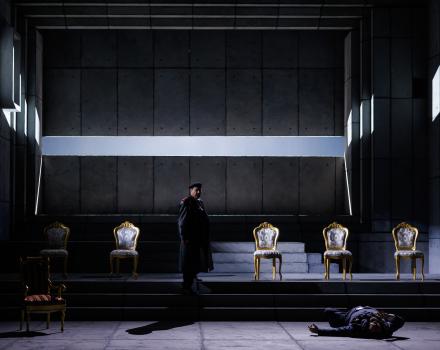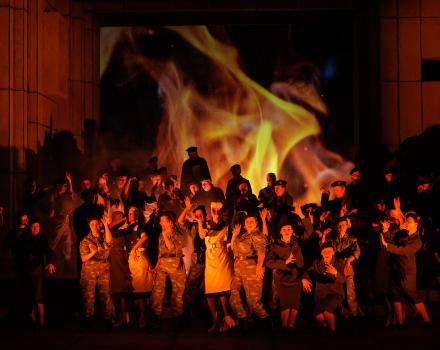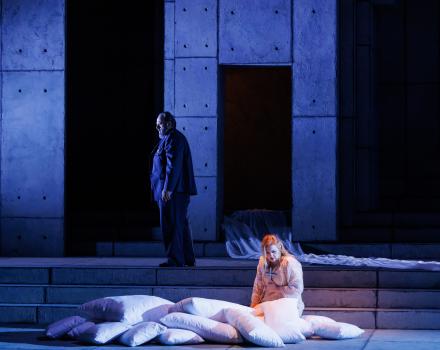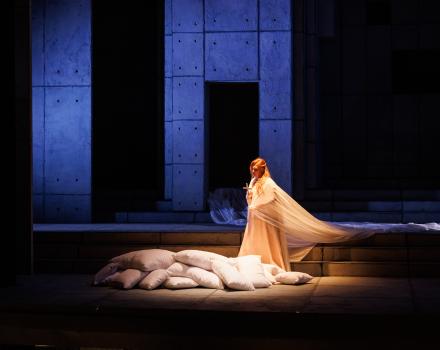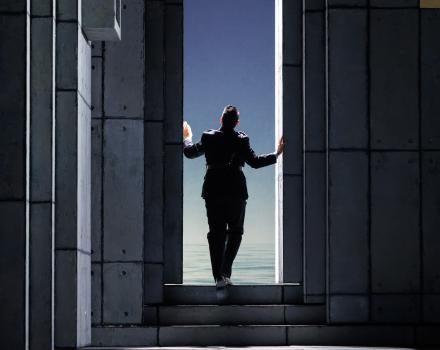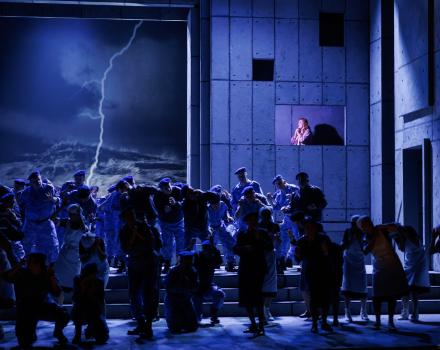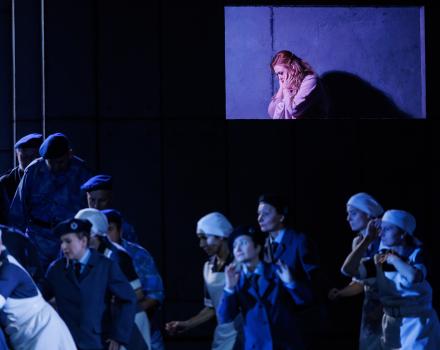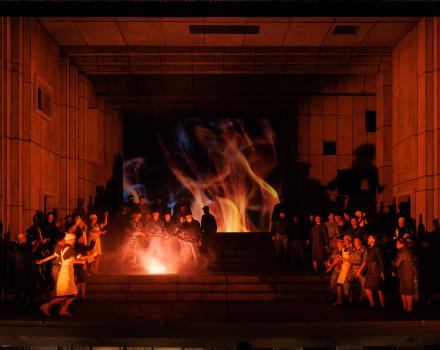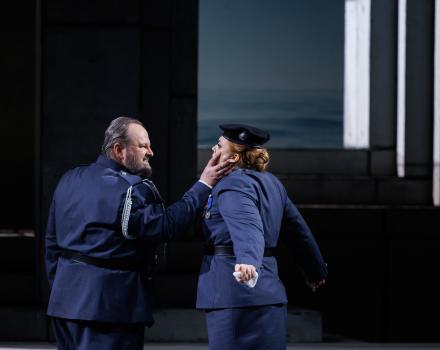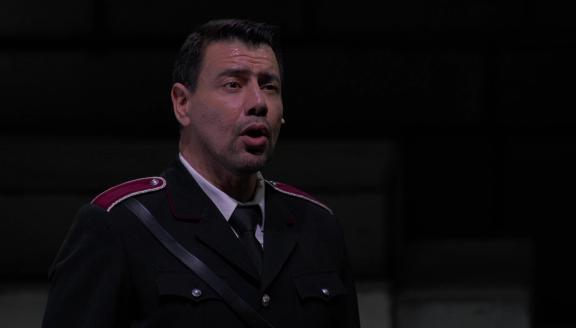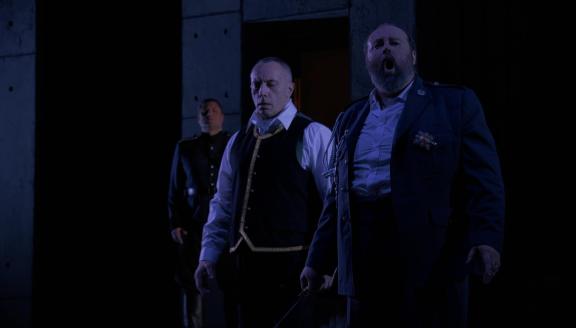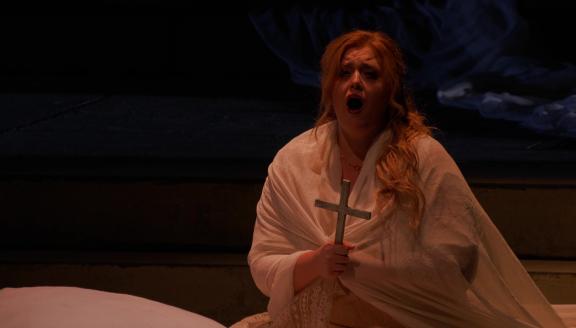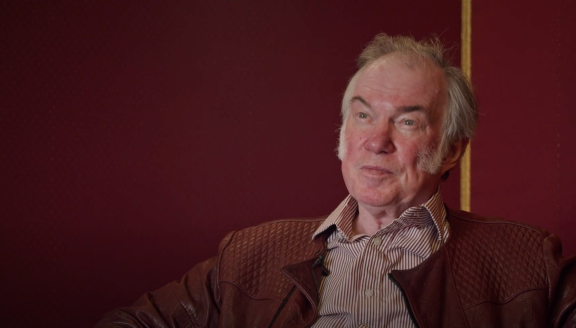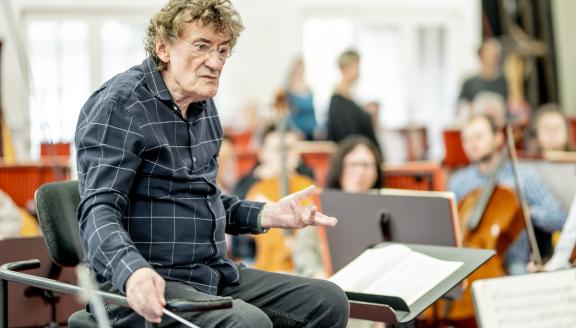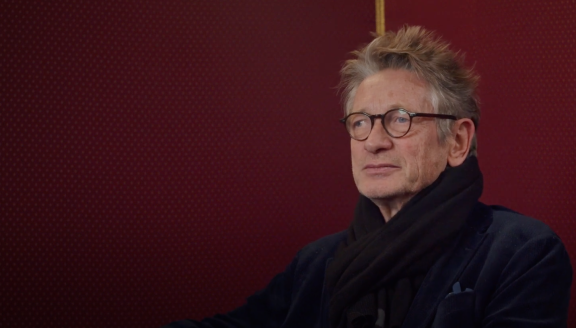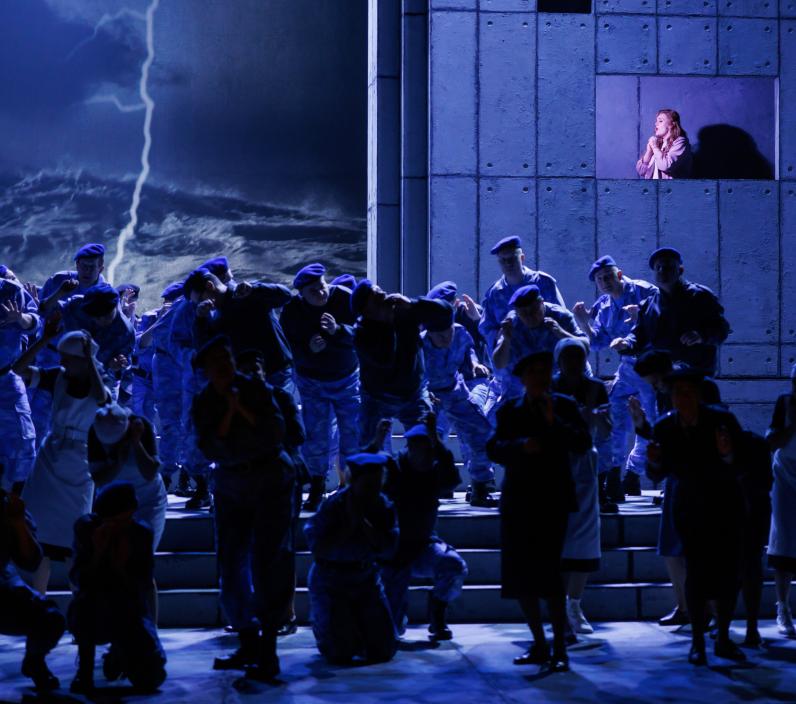
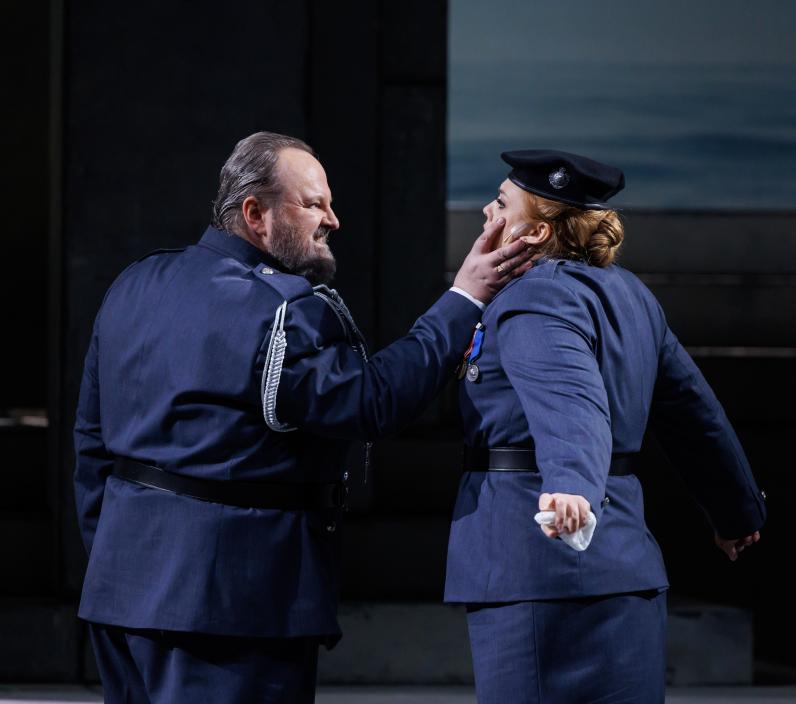
Victorious in battle, admired by his men, loved by his wife - fate seems to smile on Otello. Happy moments, however, pass imperceptibly when the hero’s mind begins to be gripped by suspicion and jealousy seeps into the heart. And doubts lead to destruction.
Otello and Falstaff are thought by many to be at the pinnacle of Italian opera. These Shakespearean masterpieces, the last two operas ever written by Giuseppe Verdi, are the fruit of a remarkable collaboration between the composer and his friend Arrigo Boito, the librettist almost 30 years his junior. Boito was influenced by translations of Shakespeare (by François-Victor Hugo for example) and emphasises Otello’s stormy passion barely allowing him to keep up appearances. Desdomona is a saintly idealisation and Iago a cynical villain on a diabolical scale. The essence of Verdi’s genius throughout his life lay in the wedding of poetry and song in balanced lyrical forms; what is different in these later collaborations with Boito is that these forms are not confined to arias and ensembles but blossom wherever poetry and the spirit of the drama suggests. Live from Poznań on the opening night of a new production, OperaVision brings you this great opera presented here in the hands of another distinguished artistic pairing; director David Pountney and conductor Jacek Kaspszyk. High drama and passionate music taking us into the darker corners of the human mind.
Cast
|
Otello
|
Gwyn Hughes Jones
|
|---|---|
|
Iago
|
Dario Solari
|
|
Desdemona
|
Iwona Sobotka
|
|
Emilia
|
Gosha Kowalinska
|
|
Casio
|
Piotr Kalina
|
|
Lodovico
|
Rafał Korpik
|
|
Roderigo
|
Piotr Friebe
|
|
Montano
|
Damian Konieczek
|
|
Herold / Herald
|
Michał Korzeniowski
|
|
Orchestra
|
Poznań Opera Orchestra
|
|
Chorus
|
Poznań Opera Chorus
|
| ... | |
|
Music
|
Giuseppe Verdi
|
|---|---|
|
Text
|
Arrigo Boito
|
|
Conductor
|
Jacek Kaspszyk
|
|
Director
|
David Pountney
|
|
Sets
|
Raimund Bauer
|
|
Costumes
|
Marie-Jeanne Lecca
|
|
Lighting
|
Fabrice Kebour
|
|
Choreography
|
Ran Arthur Braun
|
|
Video Projections
|
Karolina Fender Noińska (Jajkofilm)
|
|
Assistant conductor
|
Zofia Kiniorska
Andrei Yakushau
|
|
Assistant director
|
Barbara Poll
Dominika Babiarz
Bartłomiej Szczeszek
|
|
Chorus master
|
Mariusz Otto
|
|
Children chorus master
|
Michał Sergiusz Mierzejewski
|
| ... | |
Videos
Story
Act I
A storm and lightning accompany Otello’s return from the victorious battle. The raging element is another enemy that he must deal with. The valiant commander’s companions are uncertain whether he will survive, but Otello also triumphs over this enemy. Iago does not share the crowd’s enthusiasm. He feels cheated because it was not he who was promoted to captain, but young Cassio. He decides to take revenge on the commander. Roderigo, who is in love with Desdemona, Otello’s wife, is drawn into the intrigue. Tormented by unrequited love, he succumbs to the whispers of Iago. Amid the cheerful noise, Iago plies Cassio with drink and then provokes a row between him and Roderigo. The fighting men are separated by Montano, who has come to call Cassio to stand guard. Drunk Cassio wounds Montana. Furious, Otello calls the men to order. Cassio gets demoted. The argument wakes up Desdemona, who joins Otello. When lovers are alone, they begin to remember the dawn of their feelings for each other. Otello is tormented by the uncertainty of whether their love will survive. Desdemona reassures her loved one - nothing will stand in their way.
Act II
Iago continues to plot an intrigue with refinement, balancing the emotions and fears that each of us experiences. He advises the dejected Cassio to ask Desdemona to intercede with Otello.The young man follows his advice, but Iago sows the seeds of jealousy in Otello. Is Desdemona faithful to him? Iago’s words fall on fertile ground. Desdemona, unaware of anything, asks for mercy for Cassio. For Otello, the request proves a betrayal. The man furiously rejects her. Desdemona, scared by his anger, tries to put a scarf on his head, convinced that her beloved is suffering from a high fever. Otello ignores the gesture. Meanwhile, Iago tears the handkerchief from Emilia’s hands as she watches the incident. Otello’s engagement present will become a prop confirming his infidelity. Iago convinces the man that he heard Cassio saying Desdemona’s name in his sleep and saw her handkerchief with him. Otello swears revenge.
Act III
The herald announces an important visit, but Otello is too focused on thinking about betrayal. Desdemona again pleads for mercy for Cassio. Otello asks her about the handkerchief. The woman ignores the question and tries to get back to Cassio’s case. Otello insults Desdemona. Iago, cleverly playing a plot, allows Otello to eavesdrop on the conversation between him and Cassio. Otello is unable to make sense of the discussion, but he becomes convinced that the man is talking about his affair with Desdemona. This is confirmed by the handkerchief in Cassio’s hand, which Iago pushed into his hand. Lodovico appears with information about the demotion of Otello, who has grown too powerful. The title of commander-in-chief is given to Cassio. Deprived of any support, Otello publicly humiliates his wife. He’s at the end of his tether. Iago triumphs.
Act IV
Desdemona recalls the old Willow Song, which brought comfort to many women before her and allowed them to accept their fate. Emilia, Desdemona’s companion, walks away when Otello appears. He is unmoved, despite assurances of innocence, he strangles Desdemona. The plan to murder Cassio fails because Emilia reveals the truth about the plot devised by Iago. Distraught, Otello takes his own life.
Insights
Shakespeare, Boito and Verdi, or the Metamorphoses of Otello
When Giuseppe Verdi set out to work on Otello in the early 1880s, he had had close to thirty operas to his credit, a reputation of a great composer established throughout Europe and beyond, with a seventieth birthday drawing near. He had nurtured the desire to compose Otello for years – just like the idea to musically adapt other Shakespeare’s dramas: Macbeth, King Lear or Hamlet. The composer kept returning to Shakespeare’s works all his life; he recognised their literary quality and dramatic potential, and often expressed this fascination. Verdi owed the return to Shakespearean inspiration in the final years of his working life to meeting an extraordinary artist, and, at the same time, avid admirer of his talent, the son of an Italian painter and Polish countess Józefa Radolińska, a poet, translator, composer and librettist, Arrigo Boito.
Verdi and Boito met for the first time in July 1879 in Milan, thanks to Franco Faccia, the then conductor at the La Scala, who had known the future author of librettos for Otello and Falstaff from his school days. Initially held in a rather cautious manner, the talks concluded with Boito’s declaration to provide Verdi with the finished text of Otello without obligations of any kind on the part of the Maestro. Completed in November, the first sketch of the libretto made quite an impression on the composer.
In June 1881, in close collaboration with the composer, Boito began putting together an extended version of Otello. The new libretto took a long time to complete: it was ready in the late summer of the following year. Originally bearing the title Iago, the text, however, was close to being discarded by Verdi. In March 1884, one of Milan’s daily papers (Il Pugnolo), published words attributed to Boito, according to which the poet would like to score the new libretto himself. The article was a misunderstanding: the fragment of the interview quoted by the paper – which originated in a magazine published in Naples – completely distorted the author’s intentions which he expressed in a casual conversation with a Neapolitan journalist Martino Cafiero.
Luckily, the librettist managed to convince the composer it was all a mistake – an extensive and impassioned letter written on 19 April 1884 made it expressly clear that Boito did not intend to compete with the Maestro, and genuinely recognised his absolute supremacy in the realm of composition. Verdi let himself be endeared; without a doubt, he, too, was keen on successfully completing the endeavour he was so profoundly fascinated with. Without further ado, he began intense work on the opera, while Boito’s numerous visits to the composer’s residence in Sant’Agata, as well as very extensive correspondence which they exchanged for several months, bear testimony to both artists’ persistent preoccupation with the future masterpiece. In a letter of 5 October 1885, Verdi informed his librettist that the opera had been finished, though for the next few months he would still apply final touches to the score. Soon, he would also take the final decision regarding the title: he remained true to Shakespeare’s dramatic intuition, and Iago was stripped of the titular character status in favour of Otello.
Although Otello was finally completed in 1886, the work would still have to wait to be staged. These were Parisian theatres in particular that intensely sought priority to be able to show the new opera. Verdi, however, consistently rejected these offers. Aware of the supreme quality of Boito’s text, the composer was keen to have Otello sung for the first time in its original language: Italian. Therefore, he entrusted Milan’s La Scala with preparations for the premiere performance. In his correspondence with the librettist, on a number of occasions he discussed the potential performers of the main parts of Otello, Iago and Desdemona, only to finally assign them to three artists he was well familiar with: Francesco Tamagno, Vittorio Maurel and Romilda Pantaleoni. In January 1887, Verdi arrived in Milan to personally oversee the preparations. He would not only get engaged in rehearsals with a hundred-piece orchestra conducted by Franco Faccio, and as numerous a choir directed by Giuseppe Cairati, but also work with soloists, closely watching not only their vocal, but also acting aptitude.
According to one of the most famous anecdotes about the composer, during one of the rehearsals for the Milan premiere of Otello, Verdi – then seventy-four years old – threw himself to the stage to show the performer of the titular character how to properly act out his death. Fastidious efforts taken by the entire team yielded excellent results: the premiere performance given in the evening on Saturday, 5 February 1887, was Verdi’s great, undisputed triumph. In an extensive article published in Corriere della Sera the following day, enthralled Enrico Panzacchi, lecturer in fine arts at the University of Bologna and a music critic, wrote: ‘what we saw was a spectacle we may not see ever again’.
Extract of a longer article which was published the Otello programme of the Poznań Opera, written by Prof. Alina Borkowska-Rychlewska who works at the Department of Romantic Literature of the Institute of Polish Philology of the Adam Mickiewicz University and at the Musical Theater Research Center of the Adam Mickiewicz University in Poznań.
Gallery
